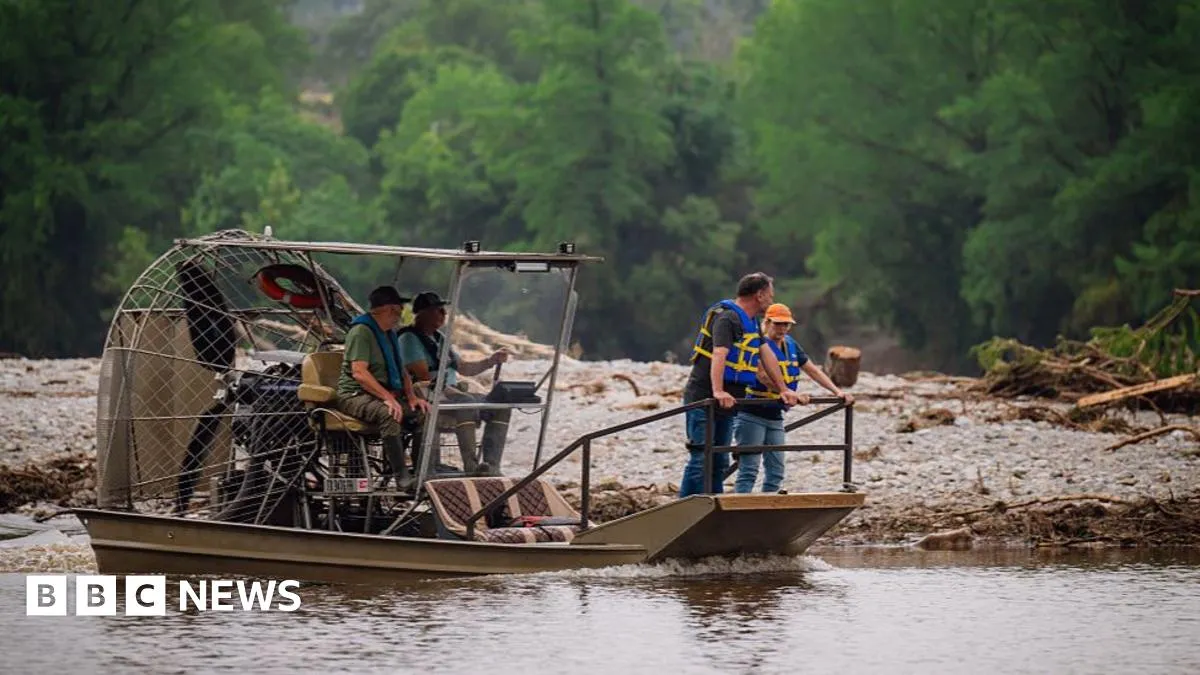
In the face of tragedy and hardship, communities often rally together to provide support. In Texas, a remarkable number of volunteers are stepping up to distribute essential supplies, including food, clean water, and clothing to those in dire need. Many volunteers are also engaged in search efforts, utilizing trucks and horses to aid in the quest for survivors and victims affected by the devastating floods.
The catastrophic flooding in Texas was the result of multiple converging factors, as explained by Matt Taylor from BBC Weather. At the time, a series of weather patterns were in play, notably the remnants of an ex-tropical storm that merged with a vast area of unstable air. This unstable air, characterized by its rapid ascent, contributed to the formation of large storm clouds. Previously, Tropical Storm Barry had caused flooding in the Yucatan Peninsula, and its moisture-laden remnants traveled across the Gulf of Mexico, further saturating the region's atmosphere.
Geography also played a crucial role in the flooding. Kerr County, where the floods were most severe, is a hilly area that forced moisture-heavy air upwards, facilitating the development of massive storm clouds. These clouds effectively became independent weather systems, resulting in extensive rainfall across a wide area. Their slow movement compounded the rainfall totals, leading to further thunderstorms and exacerbating the situation along the Guadalupe River.
As the death toll in Texas surpasses 80, questions arise regarding the adequacy of flood warnings and evacuation measures. In a short span of just 45 minutes early Friday morning, the Guadalupe River surged by 26 feet (8 meters), overwhelming its banks. Despite several flood warnings issued by the Texas Division of Emergency Management (TDEM) and the National Weather Service (NWS), the rapid rise caught many residents off guard.
The NWS expressed its heartbreak over the loss of life, asserting that they had taken all possible measures, including issuing a flood watch warning and conducting briefings the day before the tragedy. Some residents reported receiving text alerts early Friday morning, but many either did not comprehend their urgency or claim they did not receive any notifications at all. Concerns have also been raised regarding budget cuts to the National Oceanic and Atmospheric Administration (NOAA), the agency responsible for weather monitoring, which may have impacted preparedness.
Amid the devastation, stories of heroism are emerging from Texas. The Department of Homeland Security commended Coast Guard rescue swimmer Scott Ruskan for directly saving 165 lives, labeling him an American hero. In addition, Louisiana Governor Jeff Landry highlighted the bravery of Emma Foltz, a camp counselor who evacuated 14 campers to safety during the crisis.
According to a reporter from Kerr County, the search and rescue operation is progressing slowly but steadily. Rescuers are working through an extensive area filled with debris, including tree limbs and remnants from homes. Washington Post reporter Arelis Hernandez described the scene as one of overwhelming destruction, stating, "You have to go foot-by-foot and untangle all of this in case there’s something or someone underneath it all." Tragically, the community is grappling with the loss of young lives, leaving a profound impact on the area.
A flood watch continues to be in effect for Kerr County and surrounding regions, with expectations of further downpours and thunderstorms. The National Weather Service warns that some locations may experience 2 to 4 inches (51-102 mm) of rain, with localized areas potentially receiving up to 10 inches (254 mm). This weather could hinder rescue operations and contribute to additional flash flooding, especially with already elevated river levels.
Rescue volunteer Greg Froelick is leading search efforts near Camp Mystic, a Christian summer camp for girls that suffered significant damage. Reports indicate that people have been found up to eight miles (12.8 km) downstream from the camp. Froelick described the scene as chaotic, with debris piles towering over 20 feet and remnants of clothing and personal items scattered along the river. Rescuers are utilizing dogs, clearing brush, and preparing to deploy boats for further searches.
Camp Mystic, a significant focus of the search, is a cherished summer destination for girls situated along the Guadalupe River. Unfortunately, several campers and counselors are believed to be among the deceased, with the camp mourning the loss of 27 individuals. Richard Dick Eastland, the camp's long-time director, has been reported among the fatalities. The camp has long been operated by generations of the same family since the 1930s and is known for fostering spiritual growth and self-esteem among young girls.
Tragically, the casualty figures continue to rise, with over 80 confirmed deaths, including children, attributed to the flash floods in Texas. Kerr County has seen the highest toll, with 68 fatalities, including 28 children. Additionally, there have been casualties reported in Travis County, Burnet County, Williamson County, Kendall County, and Tom Green County. As search efforts persist, officials anticipate that the death toll may increase further.